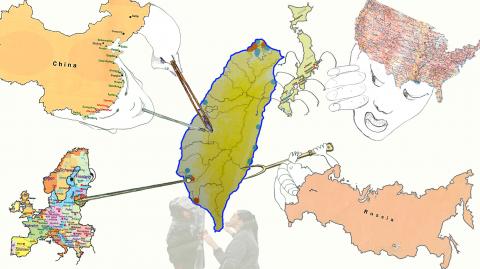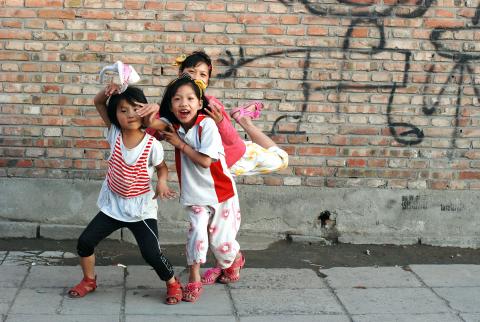The global undercurrents of angst and collective fear are the motifs of two film events set to open tomorrow. The 2015 Taipei Documentary Film Festival (2015國際華人紀錄片影展) responds to challenges and problems relevant to our daily lives with 38 works addressing a broad range of environmental and social issues. On the Road Film Festival (在路上影展) takes its cue from Jack Kerouac’s defining novel of the Beat Generation, On the Road, to look at the human condition with a more existential and literary approach through a daring, compact lineup of 21 feature, documentary, experimental and short films.
TAIPEI DOCUMENTARY FILM FEST
Restless Mind of Turbulent Years (忐忑流年) is the theme for the documentary film fest and emphasizes marginalized people in cities. The festival is organized by Chinese Next, or CNEXT, a nonprofit that disperses money to aspiring documentary filmmakers in Chinese-speaking regions.

Photo courtesy of Spot — Taipei Film House and CNEX Foundation
A Tale of Waste City (廢城記) transports audiences to a makeshift community built from waste by urban scavengers in Beijing. The city is located three kilometers from the National Stadium and is home to over 30,000 workers and their families who hail from China’s Henan Province. Life is tough but carries on — until, that is, the residents are told that the community is soon to be demolished.
Polish director Hanna Polak’s Something Better to Come follows a Russian girl named Yula for 14 years as she grows up on a gigantic landfill with her mother, friends and many others living off people’s waste outside Moscow. The documentary discovers humanity in the most dehumanizing situation, and sees Yula, now a young adult, holding her head up high and daring to dream.
Other highlights include up-and-coming Chinese documentary director Du Haibin’s (杜海濱) A Young Patriot (少年小趙), an intimate documentary that chronicles five years in the life of Zhao, a Chinese millennial who is brought up to believe in Maoism, but, as he stumbles into adulthood and goes to college, starts to question his country’s turn toward rampant state capitalism.

Photo courtesy of Spot — Taipei Film House and CNEX Foundation
Another portrait of the millennials from the US, The Internet’s Own Boy: the Story of Aaron Swartz celebrates the life of Aaron Swartz, a hacktivist devoted to advocating freedom of information in the digital age. The 26-year-old Swartz committed suicide in his Brooklyn apartment in 2013 after being threatened with a 35-year jail term.
ON THE ROAD FILM FEST
Across town, film enthusiasts are given a change to revisit familiar masterpieces and explore experimental works at the On the Road Film Festival, which, according to curator Yang Yuan-ling (楊元鈴), treats film as a voyage through time and space, across cultural borders and into the psyche.
Serbian director Emir Kusturica’s Time of the Gypsies (1988), for example, tells the surreal and absorbing tale about the life of a family of gypsies in former Yugoslavia. Die-hard cinephiles will be delighted to know that this Cannes-winning masterpiece was shot in 35mm film. Another classic shown in 35mm is Leningrad Cowboys Go America, Aki Kaurismaki’s 1989 road movie which attracted worldwide attention to the Finnish auteur known for his singular blend of bleak comedy with warm humanism.
On the avant-garde end, American experimental filmmaker, artist and scholar James Benning’s Easy Rider (2012) is a feature-length remake of Dennis Hopper’s 1969 classic of the same title. As the original work is thought to be a landmark film that captures the US counterculture of the 1960s, Benning’s version searches for the counter-culture in today’ America.
Female artists are also featured predominantly on the lineup. German new media artist Verena Kyselka creates an imaginative muse of Taiwan’s history with The Formosa Experiment (2014), while her Territory of Beauties (2012) was inspired by the Taiwanese female artists she interviewed.
American experimental filmmaker Lynne Sachs is known for her formally diverse oeuvre that explores the relationship between personal and collective experiences. Which Way is East: Notebooks from Vietnam (1994) is the director’s travelogue in Vietnam that mixes personal memories, history and parables.
Apart from screenings, several filmmakers will discuss their works during the festival period. Participating directors include Kyselka and Taiwanese experimental filmmaker Cheng Li-ming (鄭立明). More information can be found at www.spot.org.tw.

Towering high above Taiwan’s capital city at 508 meters, Taipei 101 dominates the skyline. The earthquake-proof skyscraper of steel and glass has captured the imagination of professional rock climber Alex Honnold for more than a decade. Tomorrow morning, he will climb it in his signature free solo style — without ropes or protective equipment. And Netflix will broadcast it — live. The event’s announcement has drawn both excitement and trepidation, as well as some concerns over the ethical implications of attempting such a high-risk endeavor on live broadcast. Many have questioned Honnold’s desire to continues his free-solo climbs now that he’s a

As Taiwan’s second most populous city, Taichung looms large in the electoral map. Taiwanese political commentators describe it — along with neighboring Changhua County — as Taiwan’s “swing states” (搖擺州), which is a curious direct borrowing from American election terminology. In the early post-Martial Law era, Taichung was referred to as a “desert of democracy” because while the Democratic Progressive Party (DPP) was winning elections in the north and south, Taichung remained staunchly loyal to the Chinese Nationalist Party (KMT). That changed over time, but in both Changhua and Taichung, the DPP still suffers from a “one-term curse,” with the

Lines between cop and criminal get murky in Joe Carnahan’s The Rip, a crime thriller set across one foggy Miami night, starring Matt Damon and Ben Affleck. Damon and Affleck, of course, are so closely associated with Boston — most recently they produced the 2024 heist movie The Instigators there — that a detour to South Florida puts them, a little awkwardly, in an entirely different movie landscape. This is Miami Vice territory or Elmore Leonard Land, not Southie or The Town. In The Rip, they play Miami narcotics officers who come upon a cartel stash house that Lt. Dane Dumars (Damon)

Today Taiwanese accept as legitimate government control of many aspects of land use. That legitimacy hides in plain sight the way the system of authoritarian land grabs that favored big firms in the developmentalist era has given way to a government land grab system that favors big developers in the modern democratic era. Articles 142 and 143 of the Republic of China (ROC) Constitution form the basis of that control. They incorporate the thinking of Sun Yat-sen (孫逸仙) in considering the problems of land in China. Article 143 states: “All land within the territory of the Republic of China shall